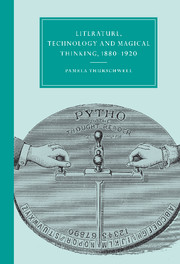Book contents
- Frontmatter
- Contents
- Acknowledgements
- Introduction
- 1 The Society for Psychical Research's experiments in intimacy
- 2 Wilde, hypnotic aesthetes and the 1890s
- 3 Henry James's lives during wartime
- 4 On the typewriter, In the Cage, at the Ouija board
- 5 Freud, Ferenczi and psychoanalysis's telepathic transferences
- Notes
- Bibliography
- Index
- CAMBRIDGE STUDIES IN NINETEENTH-CENTURY LITERATURE AND CULTURE
3 - Henry James's lives during wartime
Published online by Cambridge University Press: 22 September 2009
- Frontmatter
- Contents
- Acknowledgements
- Introduction
- 1 The Society for Psychical Research's experiments in intimacy
- 2 Wilde, hypnotic aesthetes and the 1890s
- 3 Henry James's lives during wartime
- 4 On the typewriter, In the Cage, at the Ouija board
- 5 Freud, Ferenczi and psychoanalysis's telepathic transferences
- Notes
- Bibliography
- Index
- CAMBRIDGE STUDIES IN NINETEENTH-CENTURY LITERATURE AND CULTURE
Summary
One doesn't give up one's country any more than one gives up one's grandmother. They're both antecedent to choice – elements of one's composition that are not to be eliminated.
Henry James officially gave up his country and became a British citizen on 28 July 1915. At the same time he was working on his final unfinished ghost novel, The Sense of the Past, that he had begun in 1900 but had soon abandoned. He took it up again in 1914, in the process stopping work on The Ivory Tower. According to Leon Edel, ‘that novel was too actual; the war seemed to make it obsolete. Instead he turned to the unfinished The Sense of the Past … The story of an American walking into a remote time seemed more possible to James in the midst of headlines and casualty lists.’ The standard critical take on the return to The Sense of the Past is that it was a retreat for James away from the overwhelming and unbearable sense of the present, the War. But I want to maintain that The Sense of the Past in fact resembles James's wartime writings – his posthumously published book of propagandistic essays Within the Rim – as well as letters and biographical anecdotes about James's relationship to the war effort, all of which negotiate the psychoanalytic process of identification.
- Type
- Chapter
- Information
- Literature, Technology and Magical Thinking, 1880–1920 , pp. 65 - 85Publisher: Cambridge University PressPrint publication year: 2001

